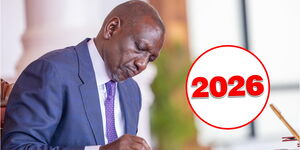The government has begun the process of formulating an improved university funding model following the High Court’s decision that quashed the previous model introduced in 2023.
Education Cabinet Secretary Julius Ogamba, who spoke to Nation Africa on Tuesday, January 28, revealed that a proposal containing the changes was in the final stage of completion.
According to the CS, a special committee established by President William Ruto last year had already submitted a preliminary draft containing the proposals with the rest of the changes expected to be completed by the end of this week.
Ogamba stated that once approved, the new funding model would come into effect by September when most first years would be joining their various institutions of higher learning.
Further, Ogamba noted that the proposal included an expansion of the variables of the Means Testing Instrument (MTI) used in determining a learner’s level of need.
The education minister also acknowledged the challenges faced by learners in the previous funding model but assured Kenyans of the government’s commitment to addressing the discrepancies.
In May 2023, President Ruto launched a new university funding model to offer financial assistance for students pursuing higher education in universities and vocational training institutions.
Upon its launch, students were urged to individually apply for the loans and scholarships through a Means Testing Instrument which categorised learners as vulnerable, extremely needy, needly, or less needy.
However, the model attracted concerns from students and parents who questioned the government’s criteria for determining a learner’s level of need. Subsequently, the model led to protests as students criticised the model for lacking transparency.
After months of uproar, the High Court in Nairobi on December 20, declared the new funding model unconstitutional stating it was discriminatory to students who had the right to education.
Justice Chacha Mwita, while delivering the ruling, noted that it was the government’s responsibility to fund public universities and thus the new funding model contravened the constitution.
The judge also faulted the government for failing to conduct adequate public participation in the piece of legislation. "It should have been subjected to the public so that the public comments before its implementation," Justice Mwita stated.
The ruling followed a petition filed by the Kenya Human Rights Commission (KHRC) last year which argued that the funding model was discriminatory and lacked transparency.
Meanwhile, a section of university students are yet to report to their learning institutions for their second semester as uncertainty looms over the future of the new funding model with most students yet to receive their capitation.












